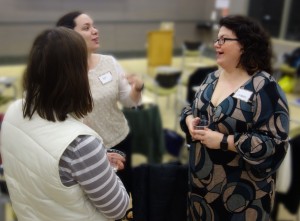I follow the American Association of State and Local History on facebook (which I would highly recommend!). The other day, they reposted an entry from their blog that caught my eye.
“5 Ways to Get a Woman Out of the Kitchen,” written by Dollie Boyd, discusses an important aspect of interpretation: how to bring to life the people often found on the periphery. In this case, the person in question is Sarah McEwen Doak, wife of Rev. Doak of Doak’s House in Greeneville, TN. The only mention of her in the visitor tour was in relation to her 13 children, which Boyd recognized as an issue that often happens in historic houses. The article talks about strategies that can be used to transform the way that we think about existing interpretation. It can be easy to continue on with current tours or exhibitions, especially with low budgets or small staff numbers. However, it is important to take a step back from everyday museum life and examine what we are interpreting and how.
This article is a good reminder for any museum, aside from historic houses, not to become complacent with the interpretation that is already in place. Who is on the margins of the stories we are telling? Whose voices are not being heard? Keep in mind that even if there is a particular point of view present, it may be marginalized, as was the case with Sarah McEwen Doak.




